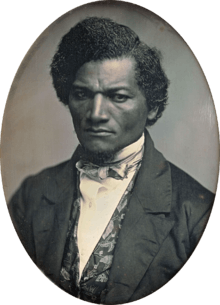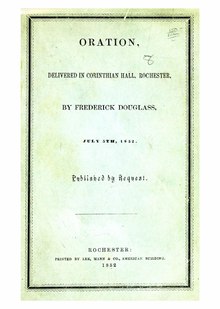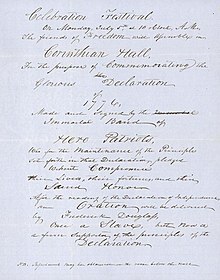What to the Slave Is the Fourth of July?
"What to the Slave Is the Fourth of July?"[1][2] is the title now given to a speech by Frederick Douglass delivered on July 5, 1852, in Corinthian Hall, Rochester, New York, addressing the Rochester Ladies' Anti-Slavery Society.[3] The speech is perhaps the most widely known of all of Frederick Douglass' writings save his autobiographies. Many copies of one section of it, beginning in para. 32, have been circulated online.[4] Due to this and the variant titles given to it in various places, and the fact that it is called a July Fourth Oration but was actually delivered on July 5, some confusion has arisen about the date and contents of the speech. The speech has since been published under the above title in The Frederick Douglass Papers, Series One, Vol. 2. [5]


While referring to the celebrations of the Independence Day in the United States the day before, the speech explores the constitutional and values-based arguments against the continued existence of Slavery in the United States.[3] Douglass orates that positive statements about American values, such as liberty, citizenship, and freedom, were an offense to the enslaved population of the United States because of their lack of freedom, liberty, and citizenship. As well, Douglass referred not only to the captivity of enslaved people, but to the merciless exploitation and the cruelty and torture that slaves were subjected to in the United States.[6] Rhetoricians R.L. Heath and D. Waymer called this topic the "paradox of the positive" because it highlights how something positive and meant to be positive can also exclude individuals.[6]
Views expressed in the speech
—Advertisement for the pamphlet of Douglass' speech from the July 12, 1852 edition of Frederick Douglass' Paper (formerly The North Star)
Douglass said that slaves owed nothing to and had no positive feelings towards the founding of the United States:
What have I, or those I represent, to do with your national independence? Are the great principles of political freedom and of natural justice, embodied in that Declaration of Independence, extended to us?...What, to the American slave, is your 4th of July? I answer; a day that reveals to him, more than all other days in the year, the gross injustice and cruelty to which he is the constant victim.[7]
Douglass also stresses the view that slaves and free Americans are equal in nature. He expresses his belief in the speech that he and other slaves are fighting the same fight in terms of wishing to be free that White Americans, the ancestors of the white people he is addressing, fought seventy years earlier.
They were statesmen, patriots, and heroes, and…with them, justice, liberty, and humanity were final; not slavery and oppression.[8]:340
Douglass also says that if the residents of America believe that slaves are "men",[8]:342 they should be treated as such. True Christians, according to Douglass, should not stand idly by while the rights and liberty of others are stripped away.
Christianity is of importance in Douglass's speech. He does not speak against religion in general, but rather how religion deals with slavery, specifically in America. He is outraged by the lack of responsibility and indifference towards slavery that many sects have taken around the nation. He says that, if anything, many churches actually stand behind slavery and support the continued existence of the institution. Douglass equates this to being worse than many other things that are banned, in particular, books and plays that are banned for infidelity.
They convert the very name of religion into an engine of tyranny and barbarous cruelty, and serve to confirm more infidels, in this age, than all the infidel writings of Thomas Paine, Voltaire, and Bolingbroke put together have done.[8]:344
Nevertheless, Douglass claims that this can change. The United States does not have to stay the way it is. The country can progress like it has before, transforming from being a colony of a far-away king to an independent nation. Great Britain, and many other countries of that time, had already abolished slavery from its territories. The British accomplished this through religion or more specifically, the church. Because the church stood behind the decision to abolish the selling and buying of human people, so did the rest of the country. Douglass argues that religion is the center of the problem but also the main solution to it.
Douglass believed that slavery could be eliminated with the support of the church, and also with the reexamination of what the Bible was actually saying.
You profess to believe, "that, of one blood, God made all nations of men to dwell on the face of all the earth," and hath commanded all men everywhere to love one another; yet you notoriously hate (and glory in your hatred) all men whose skins are not colored like your own.[8]:345
Douglass wants his audience to realize that they are not living up to their proclaimed beliefs. He talks about how they, being Americans, are proud of their country and their religion and how they rejoice in the name of freedom and liberty and yet they do not offer those things to millions of their country's residents.[8]:345
It is said that America is built on the idea of liberty and freedom, but Douglass tells his audience that more than anything, it is built on inconsistencies and hypocrisies that have been overlooked for so long they appear to be truths. According to Douglass, these inconsistencies have made the United States the object of mockery and often contempt among the various nations of the world.[8]:346 To prove evidence of these inconsistencies, as one historian noted, during the speech Douglass claims that the United States Constitution is an abolitionist document and not a pro-slavery document.[9] Douglass said:[10][11]

Fellow-citizens! there is no matter in respect to which, the people of the North have allowed themselves to be so ruinously imposed upon, as that of the pro-slavery character of the Constitution. In that instrument I hold there is neither warrant, license, nor sanction of the hateful thing; but, interpreted as it ought to be interpreted, the Constitution is a GLORIOUS LIBERTY DOCUMENT. Read its preamble, consider its purposes. Is slavery among them? Is it at the gateway? or is it in the temple? It is neither.
In this respect, Douglass' views converged with that of Abraham Lincoln's[12] in that those politicians who were saying that the Constitution was a justification for their beliefs in regard to slavery were doing so dishonestly.
However, if slavery were abolished and equal rights given to all, that would no longer be the case. In the end, Douglass wants to keep his hope and faith in humanity high. He believes that the end of slavery is near and that there is no way to stop progress.[13]
Cling to this day. Cling to it, and to its principles, with the grasp of a storm-tossed mariner to a spar at midnight... At a time like this, scorching irony, not convincing argument, is needed... It is not light that is needed, but fire. It is not the gentle shower, but thunder. We need the storm, the whirlwind, and the earthquake...
Knowledge is becoming more readily available, Douglass said, and soon the American people will open their eyes to the atrocities they have been inflicting on their fellow Americans.
Intelligence is penetrating the darkest corners of the globe. It makes its pathway over and under the sea, as well as on the earth.[8]:346
Later views on American independence
The speech "What to the Slave Is the Fourth of July?" was delivered in the decade preceding the American Civil War, which lasted from 1861 to 1865 and achieved the abolition of slavery. During the Civil War, Douglass said that since Massachusetts had been the first state to join the Patriot cause during the American Revolutionary War, black men should go to Massachusetts to enlist in the Union Army.[14] After the Civil War, Douglass said that "we" had achieved a great thing by gaining American independence during the American Revolutionary War, though he said it was not as great as what was achieved by the Civil War.[15]
Legacy
In the United States, the speech is widely taught in history and English classes in high school and college.[3] American studies professor Andrew S. Bibby argues that because many of the editions produced for educational use are abridged, they often misrepresent Douglass's original through omission or editorial focus.[3]
A statue of Douglass erected in Rochester in 2018 was torn down on July 5, 2020—the 168th anniversary of the speech.[16][17] The head of the organization responsible for the memorial speculated that it was vandalized in response to the removal of Confederate monuments in the wake of the George Floyd protests.[18]
Notable readings
The speech has been notably performed or read by important figures, including the following:
References
- Douglass, Frederick (1852). Frederick Douglass, Oration, Delivered in Corinthian Hall, Rochester, July 5th, 1852. Rochester: Lee, Mann &co., 1852. Rochester, NY: Lee, Mann &Co.
- https://teachingamericanhistory.org/library/document/what-to-the-slave-is-the-fourth-of-july/
- Bibby, Andrew S. (July 2, 2014). "'What to the Slave Is the Fourth of July?': Frederick Douglass's fiery Independence Day speech is widely read today, but not so widely understood". Wall Street Journal. Retrieved August 13, 2015.
- The paragraphing referenced here is taken from an edition of the speech at RhetoricalGoddess
- Douglass, Frederick (1982). Blassingame, John W. (ed.). The Frederick Douglass Papers, Series One: Speeches Debates, and Interviews. Vol. 2, 1847-54. New Haven: Yale University Press. p. 359-387.
- Heath, Robert L.; Waymer, Damion (2009). "Activist Public Relations and the Paradox of the Positive: A Case Study of Frederick Douglass's Fourth of July Address". Rhetorical and critical approaches to public relations II: 192–215.
- Battistoni, Richard. The American Constitutional Experience: Selected Readings & Supreme Court Opinions, pp. 66-73 (Kendall Hunt, 2000).
- Douglass, Frederick (1852). "Oration, Delivered in Corinthian Hall, Rochester, July 5, 1852". In Harris, Leonard; Pratt, Scott L.; Waters, Anne S. (eds.). American Philosophies: An Anthology. Malden, Mass.: Blackwell (published 2002). ISBN 978-0-631-21002-3.
- Colaiaco, James A. (March 24, 2015). "Frederick Douglass and the Fourth of July". St. Martin's Publishing Group – via Google Books.
- "Exceptionalism and the left". Los Angeles Times. December 13, 2010.
- African Americans In Congress: A Documentary History, by Eric Freedman and Stephen A, Jones, 2008, p. 39
- Gorski, Philip (February 6, 2017). "American Covenant: A History of Civil Religion from the Puritans to the Present". Princeton University Press – via Google Books.
- "'What, to the American Slave, Is the Fourth of July?'". The Attic. Retrieved 25 July 2018.
- Douglass, Frederick. Frederick Douglass on Slavery and the Civil War: Selections from His Writings, p. 46 (Dover Publications, 2014): "We can get at the throat of treason and slavery through the State of Massachusetts. She was first in the War of Independence; first to break the chains of her slaves; first to make the black man equal before the law; first to admit colored children to her common schools, and she was first to answer with her blood the alarm cry of the nation, when its capital was menaced by rebels."
- Douglass, Frederick. Autobiographies, p. 765 (Library of America, 1994): "It was a great thing to achieve American Independence when we numbered three millions, but it was a greater thing to save this country from dismemberment and ruin when it numbered thirty millions."
- Schwartz, Matthew S. (July 6, 2020). "Frederick Douglass Statue Torn Down On Anniversary Of Famous Speech". NPR. Archived from the original on July 7, 2020. Retrieved July 7, 2020.
- Brown, Deneen L. (July 6, 2020). "Frederick Douglass statue torn down in Rochester, N.Y., on anniversary of his famous Fourth of July speech". The Washington Post. Archived from the original on July 7, 2020. Retrieved July 7, 2020.
- Pengelly, Martin (July 6, 2020). "Frederick Douglass statue torn down on anniversary of great speech". The Guardian. Archived from the original on July 7, 2020. Retrieved July 7, 2020.
Speaking to WROC, [Carvin] Eison asked: 'Is this some type of retaliation because of the national fever over Confederate monuments right now? Very disappointing, it’s beyond disappointing.'
- Thurston, Baratunde (July 4, 2020) [Recorded July 1, 2016]. Baratunde Delivers USA Co-Founder Frederick Douglass 1852 Speech: 'What To The Slave Is The 4th of July'. Facebook. Directed by Tara Garver Mikhael. Brooklyn Public Library. Retrieved July 7, 2020.
Further reading
- Bizzell, Patricia (1997-02-01). "The 4th of July and the 22nd of December: The Function of Cultural Archives in Persuasion, as Shown by Frederick Douglass and William Apess". College Composition and Communication. 48 (1): 44–60. doi:10.2307/358770. ISSN 0010-096X. JSTOR 358770.
- Douglass, Frederick. A Narrative of the Life of Frederick Douglass, an American Slave. New York: Dover Publications, Inc. 1845.
- Douglass, Frederick, ed. Stauffer, John. Random House. 2003. My Bondage and My Freedom: Part I - Life as a Slave, Part II - Life as a Freeman, with an introduction by James McCune Smith. New York: Miller, Orton & Mulligan. 1855.
- Gates, Jr. Henry Louis, ed. Frederick Douglass, Autobiography. New York: Library of America. 1994.
- Oakes, James. The Radical and the Republican: Frederick Douglass, Abraham Lincoln, and the Triumph of Antislavery Politics. New York: W.W. Norton & Company, Inc. 2007.
External links
- Frederick Douglass' Descendants Deliver His 'Fourth of July' Speech (video)
- Discussion of the pamphlet from The Public Domain Review